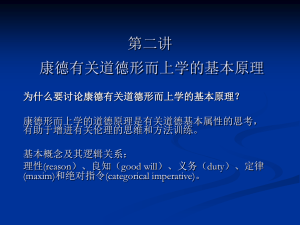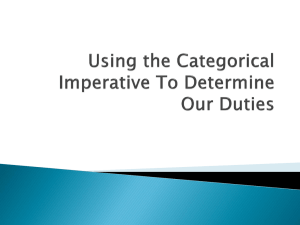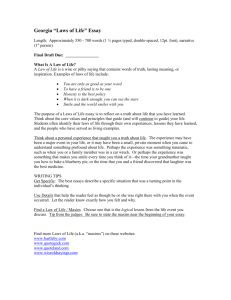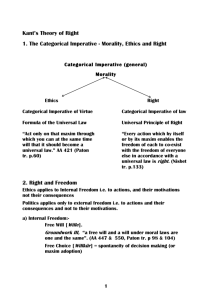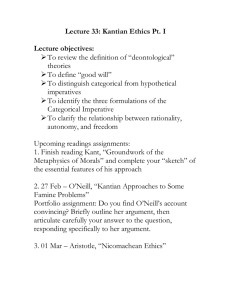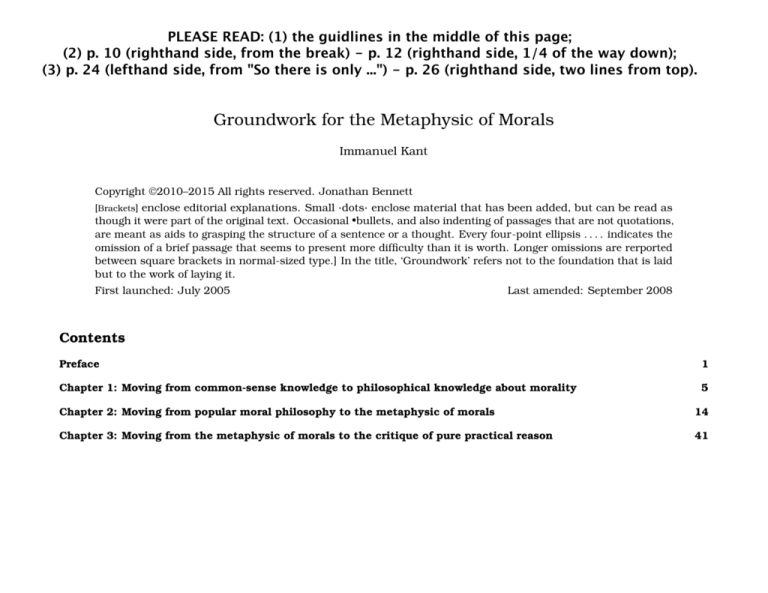
PLEASE READ: (1) the guidlines in the middle of this page;
(2) p. 10 (righthand side, from the break) - p. 12 (righthand side, 1/4 of the way down);
(3) p. 24 (lefthand side, from "So there is only ...") - p. 26 (righthand side, two lines from top).
Groundwork for the Metaphysic of Morals
Immanuel Kant
Copyright ©2010–2015 All rights reserved. Jonathan Bennett
[Brackets] enclose editorial explanations. Small ·dots· enclose material that has been added, but can be read as
though it were part of the original text. Occasional •bullets, and also indenting of passages that are not quotations,
are meant as aids to grasping the structure of a sentence or a thought. Every four-point ellipsis . . . . indicates the
omission of a brief passage that seems to present more difficulty than it is worth. Longer omissions are rerported
between square brackets in normal-sized type.] In the title, ‘Groundwork’ refers not to the foundation that is laid
but to the work of laying it.
First launched: July 2005
Last amended: September 2008
Contents
Preface
1
Chapter 1: Moving from common-sense knowledge to philosophical knowledge about morality
5
Chapter 2: Moving from popular moral philosophy to the metaphysic of morals
14
Chapter 3: Moving from the metaphysic of morals to the critique of pure practical reason
41
Groundwork
Immanuel Kant
So the action’s moral value doesn’t depend on whether what
is aimed at in it is actually achieved, but solely on the principle of the will from which the action is done, irrespective of
anything the faculty of desire may be aiming at. From what I
have said it is clear that the purposes we may have in acting,
and their effects as drivers of the will towards desired ends,
can’t give our actions any unconditional value, any moral
value. Well, then, if the action’s moral value isn’t to be found
in
•the will in its relation to its hoped-for effect,
where can it be found? The only possible source for it is
•the principle on which the will acts—and never mind
the ends that may be achieved by the action.
For the will stands at the crossroads, so to speak, at the
intersection between •its a priori principle, which is formal,
and •its a posteriori driver—·the contingent desire that acts
on it·—which is material. In that position it must be determined by something; and if it is done from duty it must be
determined by the formal principle of the will, since every
material principle—·every contingent driver of the will·—has
been withdrawn from it.
The third proposition—a consequence of the first two—I
would express as follows:
•To have a duty is to be required to act in a certain way
out of respect for law.
(1) As for what will result from my action, I can certainly
prefer or be drawn to it, but I can’t have respect for it; to
earn my respect it would have to be something the will does,
not merely something that its doings lead to. (2) Similarly,
I can’t •respect any want or preference: if the preference is
mine, the most I can do is to •endorse it; if it is someone
else’s I can even •love it—i.e. see it as favourable to my
interests. What can get respect and can thus serve as a
command is •something that isn’t (1) a consequence of my
Chapter 1
volition but only a source for it, and isn’t (2) in the service
of my preferences but rather overpowers them or at least
prevents them from being considered in the choice I make;
•this something is, in a word, law itself. Suppose now that
someone acts from duty: the influence of his preferences
can’t have anything to do with this, and so facts about what
he might achieve by his action don’t come into it either; so
what is there left that can lead him to act as he does? If
the question means ‘What is there objectively, i.e. distinct
from himself, that determines his will in this case?’ the
only possible answer is law. And if the question concerns
what there is in the person that influences his will—i.e. what
subjectively influences it—the answer has to be his respect
for this practical law, and thus his acceptance of the maxim
I am to follow this law even if it thwarts all my desires. (A
maxim is a subjective principle of volition. The objective
principle is the practical law itself; it would also be the
subjective principle for all rational beings if reason fully
controlled the formation of preferences.)
So an action’s moral value doesn’t lie in •the effect that
is expected from it, or in •any principle of action that motivates it because of this expected effect. All the expected
effects—something agreeable for me, or even happiness for
others—could be brought about through other causes and
don’t need •the will of a rational being, whereas the highest
good—what is unconditionally good—can be found only in
•such a will. So this wonderful good, which we call moral
goodness, can’t consist in anything but the thought of law
in itself that only a rational being can have—with the will
being moved to act by this thought and not by the hoped-for
effect of the action. When the person acts according to
this conception, this moral goodness is already present
•in him; we don’t have to look for it •in the upshot of
10
Groundwork
Immanuel Kant
his action.1 [In passages like this, ‘thought’ translates Vorstellung
does it conform to •duty to make a false promise? No doubt
it often is •prudent, ·but not as often as you might think·.
Obviously the false promise isn’t made prudent by its merely
extricating me from my present difficulties; I have to think
about whether it will in the long run cause more trouble than
it saves in the present. Even with all my supposed cunning,
the consequences can’t be so easily foreseen. People’s loss
of trust in me might be far more disadvantageous than the
trouble I am now trying to avoid, and it is hard to tell whether
it mightn’t be more prudent to act according to a universal
maxim not ever to make a promise that I don’t intend to keep.
But I quickly come to see that such a maxim is based only
on fear of consequences. Being truthful from •duty is an
entirely different thing from being truthful out of •fear of bad
consequences; for in •the former case a law is included in the
concept of the action itself (·so that the right answer to ‘What
are you doing?’ will include a mention of that law·); whereas
in •the latter I must first look outward to see what results
my action may have. [In the preceding sentence, Kant speaks of a
‘law for me’ and of results ‘for me’.] To deviate from the principle of
duty is certainly bad; whereas to be unfaithful to my maxim
= ‘mental representation’.]
So we have a law the thought of which can settle the will
without reference to any expected result, and must do so if
the will is to be called absolutely good without qualification;
what kind of law can this be? Since I have robbed the
will of any impulses that could come to it from obeying any
law, nothing remains to serve as a ·guiding· principle of
the will except conduct’s universally conforming to law as
such. That is, I ought never to act in such a way that I
couldn’t also will that the maxim on which I act should
be a universal law. In this context the ·guiding· principle
of the will is conformity to law as such, not bringing in
any particular law governing some class of actions; and
it must serve as the will’s principle if duty is not to be a
vain delusion and chimerical concept. Common sense in its
practical judgments is in perfect agreement with this, and
constantly has this principle in view.
Consider the question: May I when in difficulties make a
promise that I intend not to keep? The question obviously
has two meanings: is it •prudent to make a false promise?
1
Chapter 1
It might be objected that I tried to take refuge in an obscure feeling behind the word ‘respect’, instead of clearing things up through a concept of
reason. Although respect is indeed a feeling, it doesn’t come from outer influence; rather, it is a •feeling that a rational concept creates unaided; so
it is different in kind from all the •feelings caused from outside, the ones that can come from desire or fear. When I directly recognize something as
a law for myself I recognize it with respect, which merely means that I am conscious of submitting my will to a law without interference from any
other influences on my mind. The will’s being directly settled by law, and the consciousness of this happening, is called ‘respect’; so respect should
be seen as an effect of the law’s operation on the person’s will, not as a cause of it. Really, respect is the thought of a value that breaks down my
self-love. Thus it is not something to be either desired or feared, though it has something analogous to both ·desire and fear·. The only thing that
can be respected is law, and it has to be the law that we •impose on ourselves yet •recognize as necessary in itself.
•As a law it makes us subject to it, without consulting our self-love; which gives it some analogy to fear.
•As imposed on us by ourselves, it is a consequence of our will; which gives it some analogy to preference.
·This is really the only basic sense of the term ‘respect’·.
Any •respect for a person is only •respect for the law (of righteousness, etc.) of which the
person provides an example. Our respect for a person’s talents, for instance, is our recognition that we ought to practice until we are as talented as
he is; we see him as a kind of example of a •law, because we regard it as our •duty to improve our talents. ·So respect for persons is a disguised
form of respect for law·. All moral concern (as it is called) consists solely in respect for the law.
11
Groundwork
Immanuel Kant
of prudence may be very advantageous to me, though it is
certainly safer to abide by it. How can I know whether a
deceitful promise is consistent with duty? The shortest way
to go about finding out is also the surest. It is to ask myself:
•Would I be content for my maxim (of getting out of
a difficulty through a false promise) to hold as a
universal law, for myself as well as for others?
·That is tantamount to asking·:
•Could I say to myself that anyone may make a false
promise when he is in a difficulty that he can’t get out
of in any other way?
Immediately I realize that I could will •the lie but not •a
universal law to lie; for such a law would result in there
being no promises at all, because it would be futile to offer
stories about my future conduct to people who wouldn’t
believe me; or if they carelessly did believe me and were
taken in ·by my promise·, would pay me back in my own
coin. Thus my maxim would necessarily destroy itself as
soon as it was made a universal law.
So I don’t need to be a very penetrating thinker to bring it
about that my will is morally good. Inexperienced in how the
world goes, unable to prepare for all its contingencies, I need
only to ask myself: Can you will that your maxim become a
universal law? If not, it must be rejected, not because of any
harm it might bring to anyone, but because there couldn’t be
a system of •universal legislation that included it as one of
its principles, and •that is the kind of legislation that reason
forces me to respect. I don’t yet see what it is based on (a
question that a philosopher may investigate), but I at least
understand these two:
•It is something whose value far outweighs all the value
of everything aimed at by desire,
•My duty consists in my having to act from pure respect
for the practical law.
Chapter 1
Every other motive must yield to duty, because it is the
condition of a •will that is good in itself, and the value of
•that surpasses everything.
And so in the common-sense understanding of morality
we have worked our way through to its principle. Admittedly,
common sense doesn’t have the abstract thought of this principle as something universal, but it always has the principle
in view and uses it as the standard for its judgments.
It would be easy to show how common sense, with this
compass in its hand, knows very well how to distinguish
•good from •bad, •consistent with duty from •inconsistent
with duty. To do this it doesn’t have to be taught anything
new; it merely needs (Socrates-fashion) to have its attention
drawn to the principle that it already has; and thus ·we
can see· that neither science nor philosophy is needed in
order to know what one must do to be honest and good,
and even to be wise and virtuous. That’s something we
might well have assumed in advance: that the knowledge
of what every person is obliged to do (and thus also what
everyone is obliged to know) is everyone’s business, even
the most common person’s. We can’t help admiring the
way common sense’s ability to make •practical judgment
outstrips its ability to make •theoretical ones. In •theoretical
judgments, if common sense ventures to go beyond the laws
of experience and perceptions of the senses, it falls into
sheer inconceivabilities and self-contradictions, or at least
into a chaos of uncertainty, obscurity, and instability. On
the other hand, it is just when common sense excludes
·everything empirical—that is·, all action-drivers that bring
in the senses—that its ability to make •practical judgments
first shows itself to advantage. It may then start splitting
hairs, quibbling with its own conscience or with other claims
concerning what should be called right, or wanting to satisfy
itself about the exact worth of certain actions; and the great
12
Groundwork
Immanuel Kant
imperative, I know right away what it will contain. For all
the imperative contains is
the law, and
the necessity that the maxim conform to the law;
and the law doesn’t contain any condition limiting it
(·comparable with the condition that is always part of a
hypothetical imperative·). So there is nothing left for the
maxim to conform to except the universality of a law as
such, and what the imperative represents as necessary is
just precisely that conformity of maxim to law.8
So there is only one categorical imperative, and this is it:
·Act only on that maxim through which you can at the same
time will that it should become a universal law·.
Now if all imperatives of duty can be derived from this one
imperative as a principle, we’ll at least be able to show what
we understand by the concept of duty, what the concept
means, even if we haven’t yet settled whether so-called ‘duty’
is an empty concept or not.
The universality of law according to which effects occur constitutes what is properly called nature in the most
general sense,. . . .i.e. the existence of things considered as
determined by universal laws. So the universal imperative
of duty can be expressed as follows: Act as though the
maxim of your action were to become, through your will,
a universal law of nature.
I want now to list some duties, adopting the usual division
of them into •duties to ourselves and •duties to others, and
into •perfect duties and •imperfect duties.9
8
9
Chapter 2
(1) A man who has been brought by a series of troubles
to the point of despair and of weariness with life still has his
reason sufficiently to ask himself: ‘Wouldn’t it be contrary
to my duty to myself to take my own life?’ Now he asks:
‘Could the maxim of my action ·in killing myself· become a
universal law of nature?’ Well, here is his maxim:
For love of myself, I make it my principle to cut my
life short when prolonging it threatens to bring more
troubles than satisfactions.
So the question is whether this principle of self-love could
become a universal law of nature. If it did, that would be
a nature that had a law according to which a single feeling
•created a life-affirming push and also •led to the destruction
of life itself; and we can see at a glance that such a ‘nature’
would contradict itself, and so couldn’t be a nature. So
the maxim we are discussing couldn’t be a law of nature,
and therefore would be utterly in conflict with the supreme
principle of duty.
(2) Another man sees himself being driven by need to
borrow money. He realizes that no-one will lend to him
unless he firmly promises to repay it at a certain time, and
he is well aware that he wouldn’t be able to keep such a
promise. He is disposed to make such a promise, but he
has enough conscience to ask himself: ‘Isn’t it improper and
opposed to duty to relieve one’s needs in that way?’ If he
does decide to make the promise, the maxim of his action
will run like this:
A maxim is a subjective principle of acting, and must be distinguished from the objective principle, which is the practical law. The maxim contains
the practical rule that reason comes up with in conformity with the state the person (the subject) is in, including his preferences, his ignorances, and
so on; so it is the principle according to which the subject acts. The law, on the other hand, is the objective principle valid for every rational being,
and the principle by which the subject ought to act; that is, it is an imperative.
Please note that I reserve the ·serious, considered· division of duties for a future metaphysic of morals, and that the present division is merely one I
chose as an aid to arranging my examples. . .
24
Groundwork
Immanuel Kant
Chapter 2
as a rational being, he necessarily wills that all his abilities
should be developed, because they serve him and are given
to him for all sorts of possible purposes.
(4) A fourth man, for whom things are going well, sees
that others (whom he could help) have to struggle with great
hardships, and he thinks to himself:
What concern of mine is it? Let each one be as happy
as heaven wills, or as he can make himself; I won’t
take anything from him or even envy him; but I have
no desire to contribute to his welfare or help him in
time of need.
If such a way of thinking were a universal law of nature,
the human race could certainly survive—and no doubt that
state of humanity would be better than one where everyone
chatters about sympathy and benevolence and exerts himself
occasionally to practice them, while also taking every chance
he can to cheat, and to betray or otherwise violate people’s
rights. But although it is possible that that maxim should
be a universal law of nature, it is impossible to will that it
do so. For a will that brought that about would conflict with
itself, since instances can often arise in which the person in
question would need the love and sympathy of others, and
he would have no hope of getting the help he desires, being
robbed of it by this law of nature springing from his own will.
Those are a few of the many duties that we have (or at
least think we have) that can clearly be derived from the
single principle that I have stated on the preceding page.
We must be able to will that a maxim of our action become
a universal law; this is the general formula for the moral
evaluation of our action. •Some actions are so constituted
that their maxim can’t even be thought as a universal law
of nature without contradiction, let alone being willed to be
such. It’s easy to see that an action of that kind conflicts
with stricter or narrower (absolutely obligatory) duty. •With
When I think I need money, I will borrow money
and promise to repay it, although I know that the
repayment won’t ever happen.
·Here he is—for the rest of this paragraph—reflecting on
this·: ‘It may be that this principle of self-love or of personal
advantage would fit nicely into my whole future welfare, ·so
that there is no prudential case against it·. But the question
remains: would it be right? ·To answer this·, I change the
demand of self-love into a universal law, and then put the
question like this: If my maxim became a universal law, then
how would things stand? I can see straight off that it could
never hold as a universal law of nature, and must contradict
itself. For if you take a law saying that anyone who thinks he
is in need can make any promises he likes without intending
to keep them, and make it universal ·so that everyone in
need does behave in this way·, that would make the promise
and the intended purpose of it impossible—no-one would
believe what was promised to him but would only laugh at
any such performance as a vain pretence.’
(3) A third finds in himself a talent that could be developed
so as to make him in many respects a useful person. But
he finds himself in comfortable circumstances, and would
rather indulge in pleasure than take the trouble to broaden
and improve his fortunate natural gifts. But now he asks
whether his maxim of neglecting his gifts, agreeing as it does
with his liking for idle amusement, also agrees with what is
called ‘duty’. He sees that a system of nature conforming
with this law could indeed exist, with everyone behaving like
the Islanders of the south Pacific, letting their talents rust
and devoting their lives merely to idleness, indulgence, and
baby-making—in short, to pleasure. But he can’t possibly
will that this should become a universal law of nature or
that it should be implanted in us by a natural instinct. For,
25
Groundwork
Immanuel Kant
other actions, the maxim-made-universal-law is not in that
way internally impossible (·self-contradictory·), but it is still
something that no-one could possibly will to be a universal
law of nature, because such a will would contradict itself.
It’s easy to see that an action of that kind conflicts with
broader (meritorious) duty. Thinking of duties in terms not
of the object of their action but rather of the kind of obligation
they involve, what I have given is a complete display of all
the kinds of duty, in terms of their dependence on a single
principle.
Chapter 2
few exceptions—ones that strike us as unimportant and as
forced on us.
I have thus at least shown that if duty is a concept that
is to have significance and actual law-giving authority for
our actions, it has to be expressed in categorical imperatives,
never in hypothetical ones. And along with that I have made
clear—and ready for any use—the content that the categorical imperative must have if it is to contain the principle of all
duty (if there is such a thing as duty). This is a substantial
result; but I haven’t yet reached the point where I can prove
a priori that •this kind of imperative really exists, that •there
is a practical law that of itself commands absolutely and
without any action-drivers, and that •obedience to this law
is duty.
If we want to reach that point, it is extremely important
that we pay heed to this warning:
Don’t slip into thinking that the reality of this principle
can be derived from the special constitution of human
nature!
For duty has to be practical-and-unconditional necessity
of action; so it has to hold for all rational beings (the only
beings to which an imperative has anything to say), and is a
law for all human wills only because they are rational beings.
In contrast with that, anything that is derived from
•the temperament of human beings in particular, from
•certain feelings and propensities ·of human beings·,
or even from (if this is possible)
•a particular tendency of the human reason that might
not hold for the will of every rational being,
—such a thing can yield a •maxim that is valid for us, but not
a •law. That is, it can yield •a subjective principle on which
we might act if our desires and dispositions take us that way,
but not •an objective principle telling us how to act even
if all our dispositions, preferences, and natural tendencies
If we attend to what happens in us when we act against
duty, we find that we don’t (because we can’t) actually will
that our maxim should become a universal law. Rather,
we are willing that the opposite of the maxim on which
we are acting should remain as a law generally, but we
take the liberty of catering to our preferences by making an
exception—‘just for me, just this once!’. So if we weighed
everything from a single standpoint, namely that of reason,
we would find a contradiction in our own will: willing that a
certain principle •be objectively necessary as a universal law
and yet •subjectively not hold universally but rather admit
of exceptions. However, ·we don’t consider our actions in
this unitary way; rather·, we regard our action ·at one time·
from the point of view of a will wholly conformable to reason
and then ·at another time· from the point of view of a will
affected by preferences; so there is actually no contradiction,
but rather the preference’s resisting the command of reason.
In this the •universality of the principle is changed into mere
•generality—·i.e. the move is made from all to ever so many
or almost all ·—so that the practical principle of reason meets
the maxim half-way. This procedure, whether or not it can be
justified in our own impartial judgment, shows that we really
do acknowledge the validity of the categorical imperative
and allow ourselves (while keeping a wary eye on it) only a
26

